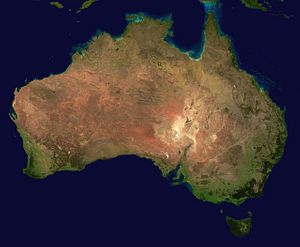The recent commercial backing of Australia Plus by three foundation partners is a boon for Australia’s soft power, and demonstrates the resilience and innovation of the Australian Broadcasting Corporation. Beyond this, it should be seen as an opportunity for Australian businesses and a case study in corporate entrepreneurship.
The vitamin and supplement company Swisse, Monash University, and the Victorian Government have each chosen to partner with ABC International’s new flagship multi-platform media offering, reportedly signing-on to advertising deals worth in the low single digit million dollar range. Although not yet enough to make the project financially sustainable, the backing suggests a viable model, and one that should be further supported. Australian organizations need regional exposure, and a strong home-grown media outlet could be the cornerstone of Australia’s international image.
Australia Plus emerges from the specter of the Australia Network, which was axed in the 2014 budget by the Abbott government. The previous network was repeatedly challenged by the Coalition ever since the highly unusual tender process in 2011, which saw Sky News Australia sidelined in favor of the national broadcaster. The loss of the Australia Network was heavily criticized at the time, with The Sydney Morning Herald claiming there were “no winners” and Australian National University’s Ashlee Betteridge arguing that it would damage news coverage of the Pacific. However, the budget saving was understandably deemed the priority.
However, beyond the politics of the ABC, the broadcaster does play a significant role in modern Australian journalism, and has a charter responsibility for international broadcasting. In a public lecture in 2009, then ABC Managing Director Mark Scott claimed the ABC should become “the dominant regional provider of news, information, and English language learning material.” These three key offerings of the ABC would naturally be born from an Australian perspective, and would ideally be consumed by internationally engaged members of the public, business, and government across Asia and the Pacific.
Although this kind of soft power is often seen as diplomatically and politically important, there is an increasingly powerful economic argument in regards to the promotion of Australia’s brand. The Australian Chamber of Commerce and Industry’s 2016 National Trade Survey highlighted the growing concerns of the business community in regards to Australia’s falling international competitiveness. Particularly in growing service exports, such as education and tourism, Australia’s international reputation and the ‘country of origin effect’ plays a significant part in determining the reception of Australian offerings overseas; demand for Australian products is influenced by consumer’s positive perceptions of Australian lifestyles and businesses. For example, sales of Australian supplements and baby products to the Chinese market are largely driven by perceptions of quality and safety surrounding Australia’s supply chains and retailers. Moreover, the general ‘reputation’ of Australia’s education system is seen as a top driver for international students choosing Australian universities, according to the Government’s international student survey. It is therefore essential for the competitiveness of all Australian business looking to expand overseas to have the backing of a strong ‘Brand Australia.’
Austrade and the Australia Unlimited initiative have worked toward shaping Australia’s international image, but there is only so much that these artificial branding activities can achieve. Ultimately, a more effective strategy for Australian businesses will be to market directly to the region. ABC International can play a key role facilitating these marketing activities; but, the real advantage for Australian businesses will be that their messages are couched in Australian content. Backed by quality Australian programming, Australian stories will work symbiotically with commercial messages to promote both Australian culture and industries.
It is essential that Australian businesses be innovative and competitive in the international marketplace, and ABC International may prove that a regional presence is commercially viable and worthwhile of industry support. Although unorthodox when compared to the majority of Australia’s domestically focused government agencies, the models provided by BBC Worldwide and Al Jazeera have shown that a significant presence in global media provides an effective platform for building and leveraging a national brand. It must be noted however that the ABC’s model flies in the face of the BBC and other national broadcasters, who pour government funds into these bastions of soft power. This new model proposed by ABC International may be commercially viable. It can prove that entrepreneurship and ambition can shift the burden from government to industry to provide a valuable service for Australian businesses.
It is an endeavor that should be applauded. It is a positive step for the broadcaster, for public institutions in general and for Australian business.
Lewis Hirst is a Project Adviser in Trade and International Affairs at the Australian Chamber of Commerce and Industry. This piece is written in a personal capacity.
































